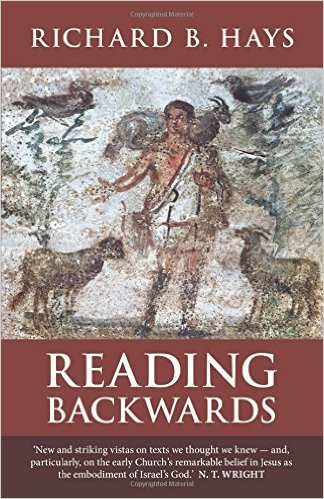 One of the many fascinating things about Richard Hays’ book Reading Backwards is the degree to which he highlights how much the best of modern biblical exegesis has moved on since Calvin.
One of the many fascinating things about Richard Hays’ book Reading Backwards is the degree to which he highlights how much the best of modern biblical exegesis has moved on since Calvin.
(For the avoidance of all doubt and the preclusion of all misunderstanding, I should clarify that I do not think that the best of contemporary theology has moved on very far past Calvin, nor do I think it desirable that we should do so. It goes without saying that Calvin remains with good reason perhaps the foremost theological influence in the Reformed church, and indeed, as a biblical exegete Calvin was unparalleled in his day. The only reason for comparing Hays to Calvin specifically is because Calvin was so good.)
The point can be seen most clearly by comparing and contrasting the different approaches taken by Hays and Calvin to the Gospels.
Hays’ project highlights the importance of the distinctive approaches taken by each of the four evangelists to the Old Testament Scriptures. These Scriptures of course constitute the decisive literary, theological, and historical background to the New Testament, but each of the evangelists alludes to them in different ways. Each of the four Gospels must be read on its own terms in order to allow the distinctive literary and theological resonances of each to sound clearly.
Calvin, on the other hand, wrote a commentary on a harmony of the Synoptic Gospels, thus effectively obscuring the literary shape of each of them. In effect, Calvin wrote a commentary not on the Gospels at all, but rather on a series of events that are described in the Gospels. But these events are all squished together in Calvin’s work, with the result that the theological voice of each becomes obscured, and the whole becames less than the sum of its parts.
If we imagine each of the four Gospels a piece of music, it’s rather as though Calvin has decided that the best way to listen to them is to put them on at the same time, while Hays remains determined to listen to each separately, precisely because he respects the integrity of them all.
The good news is that Calvin would, I’m quite sure, have been delighted with (and very probably humbled by) Hays’ work. For Reading Backwards manages not only to portray the nuances of each of the Gospels in their distinctive colours, but also to magnify the glory of our Lord Jesus Christ as the evangelists portray him. As Richard Bauckham comments, in Hays’ hands “intertextuality and high Christology turn out to be two sides of a coin.”
Rev Dr Steve Jeffery is Minister at Emmanuel Evangelical Church, London, England (Blog, Facebook, Twitter)













